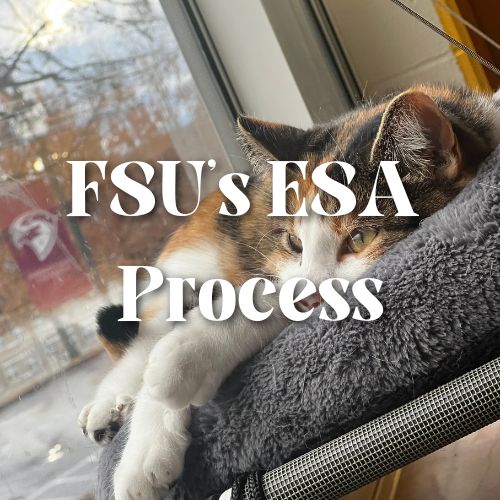After seeing one of our writers, Grayson, mention Emotional Support Animals (ESA’s) in his article “The Benefits of Academic Accommodations,” I decided I would expand on the process as someone who’s gone through the ESA process. I recognize the Fairmont State website is sometimes hard for new students to navigate, so I hope this can help anyone who wants to go through the process or is planning for their first semester here. I want to start off by saying ESA’s can be any domesticated animals, whereas service animals for medical use are dogs. ESA’s and Service Animals are not the same when it comes to training and laws. ESA’s are not medically trained, they are only protected by Federal Fair Housing Act (FFHA), and the U.S. Department of Housing and Urban Development (HUD). FSU’s website defines ESA’s as, “Any animal that provides emotional support alleviating one or more symptoms or effects of a person’s disability.” However, service animals are considered medical equipment for those with health issues. ESA’s are there for those who struggle with mental health and other disorders, they can alleviate loneliness, and sometimes help with depression, anxiety, and certain phobias in a housing environment like college dorms.
Where Can They Go on Campus?
According to FSU’s website, “A Service Animal must be allowed to accompany the handler to any place in the building or facility where members of the public, program participants, customers, or clients are allowed. An ESA must stay in your private living space.” This does not stop you from walking your ESA on campus, from my own experience, as long as
they are on a leash or in a carrier, they can be outside of the FSU Residence Halls. Most of the ESA’s I’ve personally seen on campus are cats, and many of which I’ve seen in dorm windows. My cat is leash trained and I occasionally take her outside of the dorm to just walk around. I’ve seen other students bring their cats into the Falcon Center Quad when campus isn’t too busy.
FSU’s ESA Process:
If you have a roommate in your dorm, please check with them beforehand. If they are comfortable with your ESA that’s amazing! Housing will contact your roommate as well to ensure that the ESA will not bother them in the dorm and to make sure they don’t have any concerns. The first step in this process is submitting the registration form, which can be found on the website at the end of the article. If you’ve already registered with Accessibility Services, you will need to complete a supplemental accommodation request, which can be found on the Accommodate for Students Power Point. The next part is getting the ESA documentation, which the school provides a form that can be used for the students and medical professionals convenience, from a licensed professional, i.e., a therapist. They must submit documentation verifying you need the ESA.
Everyone has their own reasons for needing one, I know for my case it’s because of how terrible my anxiety can get most days. The documentation from the provider will need to be sent directly to the school by emailing [email protected] or through faxing to 304-367-4584. You need to review the Assistance Animal Policy Agreement, which can be found on the website at the bottom of the article. The owner of the ESA must obey the laws when it comes to the care and treatment of animals. I personally recommend reading through the entire Assistance Animal Policy Agreement before starting the process and during, to ensure you understand what the rules
are for Housing and Accessibility Services. The process focuses mostly on cats and dogs as they are the most common ESA’s on campus. If you have questions about other animals, I do recommend contacting Accessibility Services.
The Animal Paperwork:
For the paperwork you need to submit a photo of your pet, proof of rabies vaccine for cat and dog, proof of flea medication for cat and dog, and proof of spay/neuter for cat and dog. If you cannot afford the vet trip for the vaccinations, I recommend looking into Tractor Supply’s events for vaccinations for cats and dogs. They hold events almost every Saturday at their stores at times ranging from 1:30pm-3:30pm and 4:00pm-5:30pm. They are affordable and the staff I’ve interacted with are extremely nice and caring towards the animals and their owners. If you do bring a cat to them, and they are leash trained, do bring your carrier with you as cats do need to be in cages to see them. For those who struggle to afford the vet bills for the spay/neuter procedure, WV has a program called SNIP that has reduced rates for spaying and neutering.
After the paperwork is submitted, the housing committee will meet bi-weekly to review the applications. You will be notified whether your accommodation was approved or not approved by the committee. If your request is approved, you will schedule to meet with the Accessibility Coordinator to review the Assistance Animal Policy and Agreement. After everything is completed, housing will give final approval and then the ESA can be brought to campus. You have to wait for housing to approve of the ESA before bringing them on campus and into the Residence Halls.
Final Thoughts:
As someone who didn’t start off their college career with an ESA present, I can tell you mine (who’s the cover photo) has made a difference in my mood on campus and off campus. I found myself being able to stay on campus more because of the comfort my cat brings me, and not wanting to leave and go home every weekend. My recommendations for those of you with ESA’s that are cats include, a small cat tree, which can be found on Amazon, to just encourage them from not scratching furniture, covered litter box and decently sized litter mat, and a pet fountain if possible. All of these things have made my life a lot easier with my cat. If it’s possible for you, I also recommend leash training, especially if your cat is used to going outside occasionally when home. Not all cats enjoy it, but others do and it’s a great way to socialize your ESA with others.
Important Links:
https://www.fairmontstate.edu/student-services/accessibility/students/assistance-animals.aspx
https://fairmontstate-accommodate.symplicity.com/public_accommodation/
https://www.fairmontstate.edu/_files/accessibility/assistance_animal_policy_and_agreement.pdf










